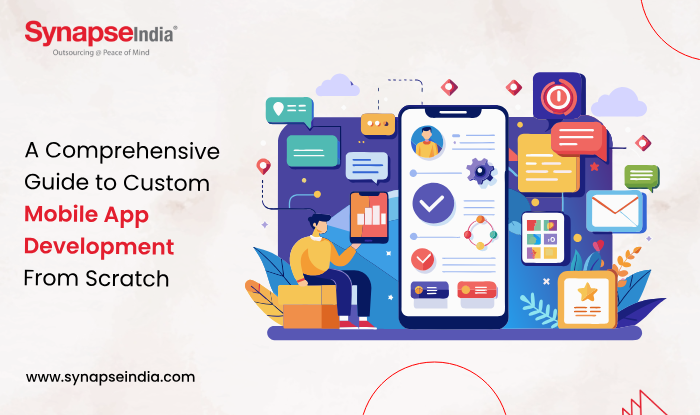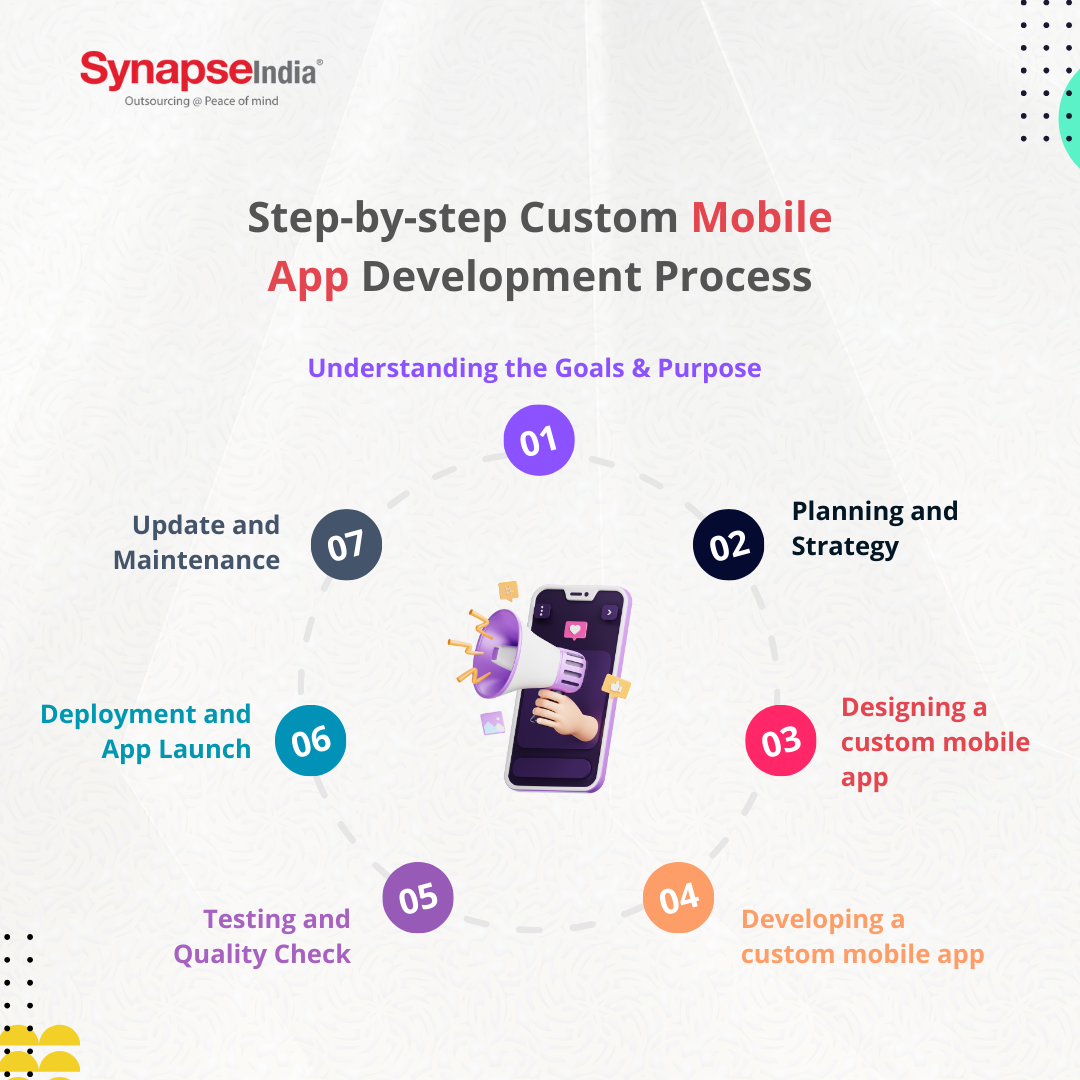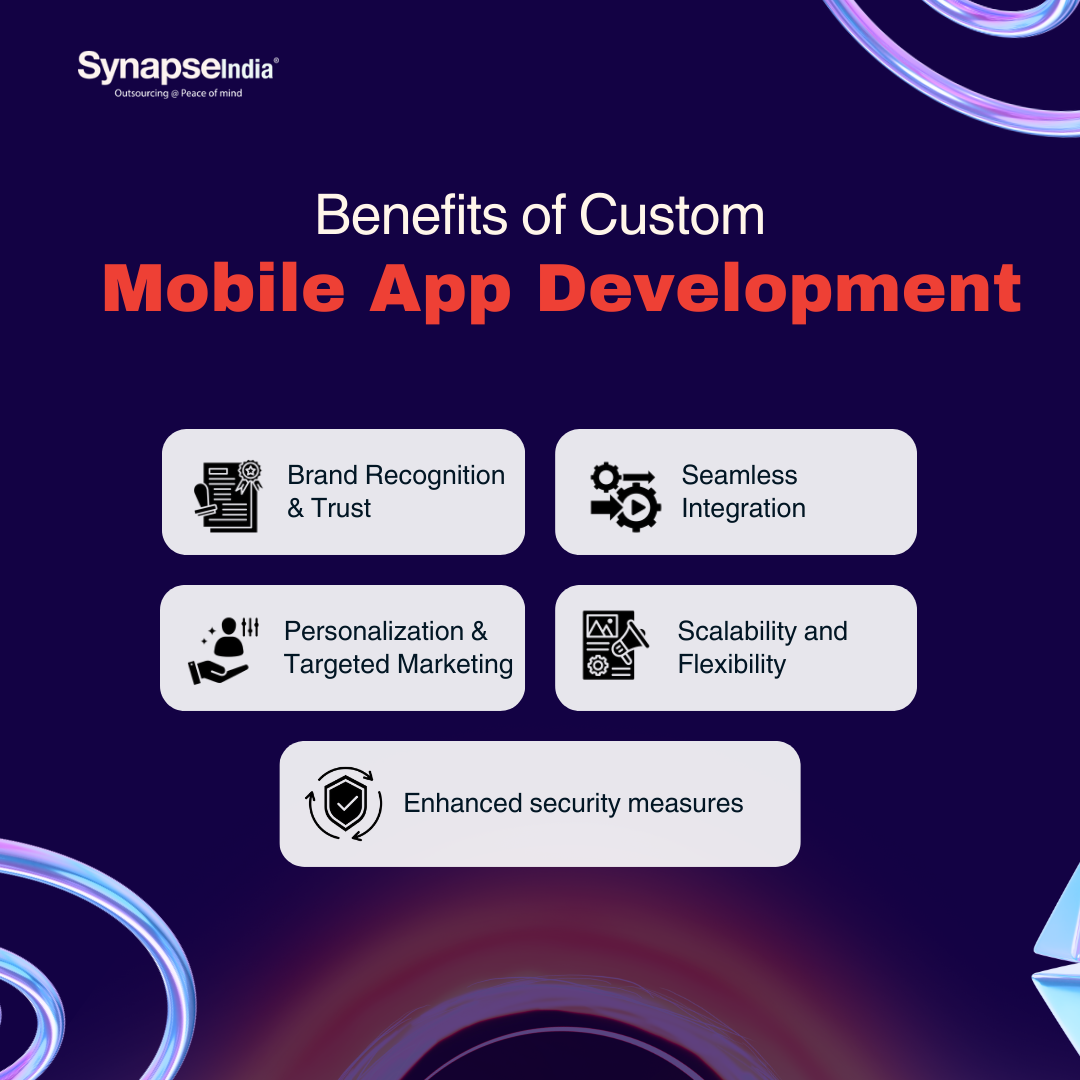 16 Sep 2024
16 Sep 2024
Developing a custom mobile app from scratch is a complex process involving careful planning, design, development, and ongoing maintenance. This guide can help you navigate the intricacies of app development and create a successful mobile app for your business.
With the increasing number of mobile users, it is not merely a trend anymore but a necessity for businesses to have a well-designed mobile application. By relying on custom mobile app development, businesses can grow their market presence, attract more customers, and enjoy enhanced productivity.
Mobile applications offer customers a convenient way to interact with businesses. As a result, more and more businesses are looking for custom mobile app development services so that they do not miss out on the several opportunities that these applications bring with them. Custom apps offer a plethora of benefits and with the right expertise, they can be created without any hassle.

As the name suggests, custom mobile app development is the process of designing a mobile application that is customized to serve specific business needs. Custom mobile apps are developed for particular organizations, keeping in mind their precise business challenges.
Custom app development makes sure that every feature and functionality of the designed application aligns with the needs and objectives of the business they are built for.
To build a successful custom mobile application, proper planning and a strategic approach are required. Custom mobile app development is an iterative process comprising several steps. Although it can be a little overwhelming to create a custom mobile app from scratch, an experienced custom mobile app development company can create one without much effort. They come with the right expertise to carry on each stage of the development process with efficiency.
So, whether you want to hire professional app developers for your custom mobile app or want to give it a go, the decision lies solely with you. Below here we have discussed the detailed process for custom mobile app development from scratch.

Before beginning the development process, it is necessary to give some thought to the mobile application that you are looking forward to creating. It is important to define the purpose and objective of the app, the problem it is expected to solve, the audience it is supposed to target, and much more. A mobile app can do so much for your business but only if you design with a clear set of objectives.
It is also important to conduct thorough market research to understand your competition and target audience. You can learn from the strengths and weaknesses of similar apps, gather crucial feedback from potential users, and develop a final product that goes beyond expectations.
After you are done with the above step, next is creating a proper plan and strategy to carry out the development process. This includes defining the features, functionalities, and overall user experience for your app. You also need to decide on a budget and timeline for the app development. This is important to keep the development process from deviating from the track. If you are hiring a custom mobile app development company, make sure to discuss these points in detail with them.
App development planning also involves deciding whether to develop a native app, a cross-platform app, or a web app. Different development strategies have their own benefits and drawbacks. Based on the requirements of your business and the objective of your application, you need to make a clear decision.
Once the development strategy is clear, designing the application interface can start. This involves creating wireframes to visualize a basic app layout and user flow. To further envision the design and functionality of the app, identify potential issues and refine the user experience prototypes need to be developed.
After user experience comes user interface designing. Your mobile app should have an intuitive and visually appealing interface that not only enhances the user experience but also reflects your brand identity.
When the app design is ready, there is nothing left to do but convert the idea into reality, i.e., developing the app. The development stage involves creating the app functionality, implementing backend services, and integrating it with essential third-party services.
During the development stage, app developers write the code for the front-end and back-end design. For front-end design, the focus is on ensuring that the app design is implemented successfully for a better user experience. The back-end design includes connecting the application with databases and servers. The application is also integrated with third-party services like payment gateways, analytics tools, and social media platforms.
To ensure flawless performance of the mobile app, a comprehensive evaluation is carried out. The app is tested on various parameters, the most significant ones being function, performance, usability and security.
Functional Testing: This ensures that all features and functionalities of your app work in the way they were designed to. user interactions, data handling, app scenarios, etc. are tested under this parameter.
Performance Testing: It evaluates the performance of the app under different circumstances and includes load testing, responsiveness, resource usage, network speed and device capabilities.
Usability Testing: The app is tested with real users to gather feedback from them and the application is then improvised in accordance with that feedback.
Security Testing: The mobile application is tested for vulnerabilities and potential threats under security testing. This is important to keep customers’ data safe in case of cyberattacks.
After successful testing, the app becomes ready for deployment. You can submit your application on different app stores like Google Play, App Store, etc. To improve the visibility and downloadability of your application, you need to implement app store optimization (ASO) strategies. Make sure that your app is in line with the submission guidelines.
Once your application is fully functional, it is important to make sure that it remains functional. This is where post-launch maintenance kicks in. You need to continuously monitor the performance of the app, gather user feedback and check app reviews to identify areas for improvement.
Furthermore, release regular updates to fix bugs and ensure compatibility with the latest operating system versions.
With custom mobile apps, businesses can provide unique experiences to their customers. This not only enhances customer experience but also offers your business a competitive advantage in the market.
Here are some key advantages of developing a mobile app for your business:

Designed with the specific branding of an organization in mind, custom mobile applications are a great way to increase brand recognition. With a strong brand identity, businesses have the opportunity to stand out in this highly competitive market.
By offering innovative and unique experiences to the customers, custom apps can also help in earning customers’ trust and loyalty. Custom apps allow you to serve your customers in a way that your competitors might not. This is quite helpful in attracting new customers to your business by highlighting the competitive advantages that your business offers.
Custom apps can be created to match the distinctive preferences, behaviors, and needs of the customers. It allows you to create an interface that is aesthetically pleasing and a design experience that is unforgettable. Your mobile app can include features, and functionalities that meet the users’ expectations offering them a personalized experience.
Businesses can also create targeted marketing campaigns based on preferences and purchase history by collecting valuable insights from their custom mobile applications. They can also collect feedback from their customers and upgrade the look and feel of their mobile apps accordingly.
Since they are designed keeping your business and organizational needs in mind, custom mobile apps can integrate seamlessly with the existing systems. Seamless integration makes sure that your business processes and workflows are smooth and streamlined. It also ensures data security and maintains data integrity, thus enhancing overall operational efficiency.
Custom mobile apps are built with scalability in mind so that your business does not experience any setbacks as it expands. As compared to off-the-shelf software solutions , custom applications are easier to scale up whenever required. Custom apps can accommodate the increased traffic of a growing business without affecting its performance.
As a business evolves and needs the integration of additional features to meet the changing needs of its customers, custom apps can be modified accordingly. Designed with flexibility features, custom apps can be changed without changing the whole infrastructure of the organization.
Security is a major concern for any business and most off-the-shelf applications are lacking in this area. However, with custom-designed apps, this issue can be handled very effectively. With a customized app, you can implement robust security measures that are suited specifically for your business. This helps eliminate the risk of potential threats to the sensitive data that businesses deal with on a regular basis.
By eliminating any possible risk, businesses can not only safeguard important data but their customers’ trust and at the same time also prevent financial losses.
By meeting the specific objectives of your business process, custom mobile applications can deliver amazing results. However, companies often face certain challenges when it comes to custom application development. Some of these challenges include:
Although it comes with a wide range of benefits, the initial cost of developing a custom mobile application can be high. Unexpected issues and technical challenges can even increase the development cost, making it difficult to manage the budget. Sticking to a clearly laid budget plan sometimes poses a little bit of a challenge.
Unexpected issues and technical challenges not only increase the budget of your custom app development but stretch the timeline as well. Moreover, realizing some missing features or modifying any functionality midway through development is also a common issue that causes timeline delay.
Although custom apps are developed keeping integration features in mind, it is a little complex to achieve a smooth integration in case of outdated systems. Apart from integration with the existing systems, the app also needs to be integrated with third-party services which may present compatibility issues.
Creating an intuitive and responsive application is a challenging task that requires a deep understanding and expertise in app development. From designing to developing, testing and monitoring the app, every stage of the development process requires specialized knowledge. Finding skilled developers experienced in the latest technologies can be difficult.
Finding the right partner for your custom mobile app development needs is important for the success of your project. But to find the right partner, you need to know the qualities that you should be looking for in a custom app development company.
Look for a custom app development firm that has a history of delivering high-quality mobile apps for their clients. You can check their portfolio and client testimonials to get an idea of how they have worked with their clients in the past and whether their services are worth considering.
Make sure that they have experience in working with the latest technologies and make the most out of those technologies while designing a custom mobile app for your business.
Also make sure that your app development partner offers post-launch maintenance support, as it is essential for the smooth and flawless running of your application.
Mobile app development is going through massive change, with certain trends leading the way to this change in 2025. As per the data from Exploding Topics, users are spending more than 3 hours daily on their smartphones, making it important for businesses to offer value through mobile apps. Keeping in line with the latest trends, businesses can develop apps focused on innovation, personalization, and user engagement
Artificial Intelligence (AI) and Machine Learning (ML) are the two most important technologies when it comes to mobile app development. In 2025, AI-driven insights are being used to analyze user behavior, preferences, and real-time actions to deliver hyper-personalized experiences. From tailored content recommendations to predictive user interfaces, ML is making apps more intuitive and user-focused.
The widespread rollout of 5G networks is reforming app performance. With ultra-low latency and lightning-fast speeds, developers are creating feature-rich applications that support seamless streaming, enhanced augmented reality (AR), and immersive virtual reality (VR) experiences.
The demand for efficient app-building tools has surged. Low-code and no-code platforms allow businesses and individuals to create apps rapidly without extensive technical expertise, making custom development accessible to a wider audience.
Super apps are gaining momentum, combining multiple functionalities into a single platform. These apps minimize the need for multiple downloads by integrating services like payments, e-commerce, messaging, and entertainment.
As app downloads have already reached over 250 billion annually (as per Statista) and are set to exceed even further, developers are prioritizing sustainability. Green coding practices, energy-efficient app designs, and ethical data usage are becoming essential in response to consumer awareness and environmental concerns.

Custom mobile app development services are the best way to get an application designed precisely for your business. Proficient developers know all the ins and outs of the custom app development process and leverage their expertise to deliver you a high-quality mobile app for your business. Partner with an app development firm for your custom mobile app and look forward to success in the dynamic world of mobile technology.
A custom mobile app enhances your business by providing excellent user experiences, boosting customer engagement, and streamlining operations. It offers a platform for direct communication and enables the use of data insights for better decision-making. Tailored to your goals, it ensures a competitive edge in today’s mobile-first world.
Choose a native app for superior performance, seamless user experience, and access to platform-specific features. Go for a cross-platform app to save development time and costs while reaching a broader audience on multiple platforms. Your decision should align with your budget, audience, and app complexity requirements.
Yes, your app can integrate with other software using APIs. Integration enables smooth data sharing with tools like CRMs, ERPs, or payment gateways. This enhances functionality, automates workflows, and provides a unified user experience, making your app more versatile and valuable to users and businesses alike.
Yes, your app can work on both Android and iOS platforms. You can achieve this by building a cross-platform app using frameworks like Flutter or React Native, ensuring consistent functionality and design. Alternatively, creating separate native apps for each platform provides optimal performance and platform-specific features tailored to your audience.
Absolutely! A custom app helps small businesses enhance customer engagement, improve brand visibility, and do so much more. It allows direct communication through push notifications, easy access to products or services, delivering personalized experiences, etc. Additionally, it boosts credibility, fosters loyalty, and helps drive growth and competitive advantage.

